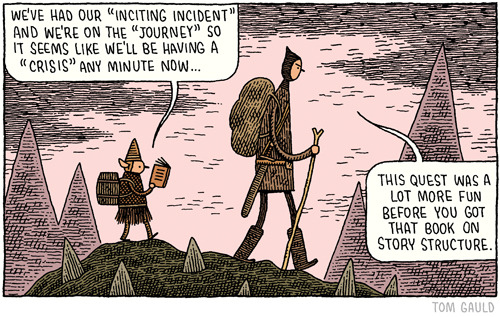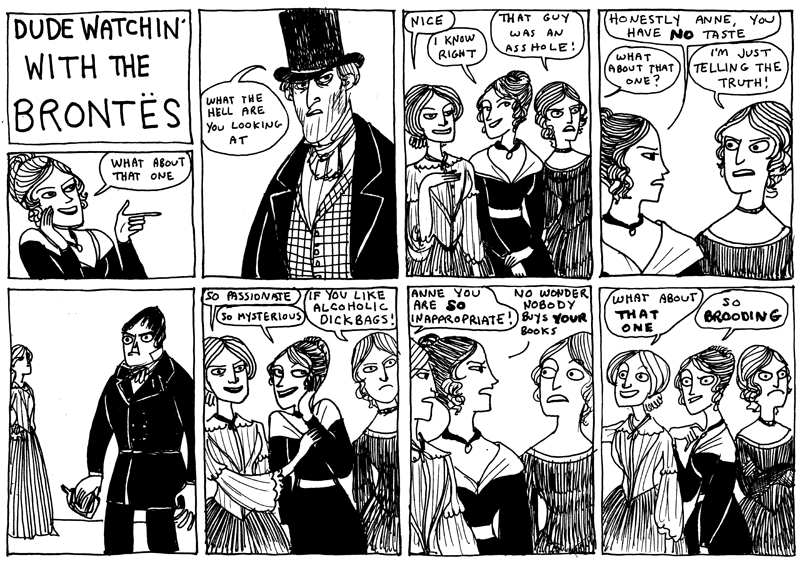Happy Boxing Day!
Here is the link to a product/toy that encourages the kind of creative storytelling I described in my previous post:
http://www.storycubes.com/
It's a set of nine cubes about the size of board game dice, and one of those tiny plastic hourglasses. Each side of each cube has a little graphic on it : an elf, a house, a cell phone, a flower, a sad face, etc., for a total of 54 sides and...I don't know how many combinations. Lots.
You roll the cubes and then make up a story in which every image appears. Which is nice because you don't need to be able to read or write to play.
So: Once upon a time, there was an elf who was sad because he lost his cell phone. He looked all over his house, but couldn't find it anywhere. One day, a magic talking flower appeared...and so on.
There are different versions which feature different themes: "Enchanted", "Actions", "Voyages", for example, and the instructions, after laying out the official rules, encourage players to make up their own rules--gotta love that.
experiments in leading a reluctant writer into the world of writing. plus a few other goodies.
Thursday, December 26, 2013
Saturday, December 14, 2013
Story Structure, Brontes, comics
 |
| see this and more at http://myjetpack.tumblr.com/ |
Tom Gauld is my new favorite artist/cartoonist. His book "You're All Just Jealous of my Jetpack" is available for purchase. Great Christmas present idea.
My other favorite is Kate Beaton (this particular sample is not so appropriate for, uh, younger readers):
 |
more at http://www.harkavagrant.com/archive.php |
She has a book out, too. It's called "Hark, A Vagrant". Get it.
Tuesday, December 3, 2013
Winter Love Poem: "Oranges" by Gary Soto
I think I first read this in the early or mid-nineties. It was in a high school textbook, maybe, or an anthology meant for teenagers. I love the innocence and the earnestness of the speaker, and I love how sensory/sensual the poem is. It could be a film. Imagine: the lamplit porch, the girl's face--you can just see the couple's breath in the air as they walk down the street. The bell in the drugstore, the nickel in the speaker's pocket, the orange fire in his hands at the end. Happy December.
Oranges
by Gary Soto
The first time I walked
With a girl, I was twelve,
Cold, and weighted down
With two oranges in my jacket.
December. Frost cracking
Beneath my steps, my breath
Before me, then gone,
As I walked toward
Her house, the one whose
Porch light burned yellow
Night and day, in any weather.
A dog barked at me, until
She came out pulling
At her gloves, face bright
With rouge. I smiled,
Touched her shoulder, and led
Her down the street, across
A used car lot and a line
Of newly planted trees,
Until we were breathing
Before a drugstore. We
Entered, the tiny bell
Bringing a saleslady
Down a narrow aisle of goods.
I turned to the candies
Tiered like bleachers,
And asked what she wanted -
Light in her eyes, a smile
Starting at the corners
Of her mouth. I fingered
A nickel in my pocket,
And when she lifted a chocolate
That cost a dime,
I didn't say anything.
I took the nickel from
My pocket, then an orange,
And set them quietly on
The counter. When I looked up,
The lady's eyes met mine,
And held them, knowing
Very well what it was all
About.
Outside,
A few cars hissing past,
Fog hanging like old
Coats between the trees.
I took my girl's hand
In mine for two blocks,
Then released it to let
Her unwrap the chocolate.
I peeled my orange
That was so bright against
The gray of December
That, from some distance,
Someone might have thought
I was making a fire in my hands.
Oranges
by Gary Soto
The first time I walked
With a girl, I was twelve,
Cold, and weighted down
With two oranges in my jacket.
December. Frost cracking
Beneath my steps, my breath
Before me, then gone,
As I walked toward
Her house, the one whose
Porch light burned yellow
Night and day, in any weather.
A dog barked at me, until
She came out pulling
At her gloves, face bright
With rouge. I smiled,
Touched her shoulder, and led
Her down the street, across
A used car lot and a line
Of newly planted trees,
Until we were breathing
Before a drugstore. We
Entered, the tiny bell
Bringing a saleslady
Down a narrow aisle of goods.
I turned to the candies
Tiered like bleachers,
And asked what she wanted -
Light in her eyes, a smile
Starting at the corners
Of her mouth. I fingered
A nickel in my pocket,
And when she lifted a chocolate
That cost a dime,
I didn't say anything.
I took the nickel from
My pocket, then an orange,
And set them quietly on
The counter. When I looked up,
The lady's eyes met mine,
And held them, knowing
Very well what it was all
About.
Outside,
A few cars hissing past,
Fog hanging like old
Coats between the trees.
I took my girl's hand
In mine for two blocks,
Then released it to let
Her unwrap the chocolate.
I peeled my orange
That was so bright against
The gray of December
That, from some distance,
Someone might have thought
I was making a fire in my hands.
Monday, December 2, 2013
Your Turn, My Turn: Writing Stories Together
We’ve all played this game: take turns writing (or telling) a story, one sentence at a time:
Player 1: Once upon a time, there was an ogre who lived in a castle.
Player 2: He had fifteen trunks of gold in the dungeon.
Player 1: One day, a sixteenth trunk fell out of the sky, but it did not contain gold.
Player 2: It contained a dinosaur!
etc.
It makes the blank page a little less threatening, makes room for (and even rewards) non-linear thinking, pumps up fluency.
Here are some ways to fiddle with it to make it more (or less) academic, more (or less) linear, and more (or less) predictable:
1) Leave off the last couple of words of each sentence:
Player 1: Once upon a time, there was an ogre who lived in a--
Player 2: --coffeeshop, because he LOVED coffee. One day--
Player 1: --he got a little out of control and ate up all the coffee beans. All that caffeine made him crazy, and the next thing he knew--
2) Make a standard requirement for every sentence. This can be a good way to practice a specific grammatical or writing principle. Take conjunctions:
End each sentence with a conjunction:
Player 1: Harry charged down the street, waving his hat and shouting because…
Player 2: ...he was trying to catch the bus. He had almost caught it when…
For these games, it helps to have a list (of conjunctions, prepositions, adverb phrases, whatever) handy.*
3) For a little more variety, make “requirement” cards beforehand labeled with parts of speech, number of words, vocabulary, silly requirements, whatever you want to focus on. Each player draws a card before his/her turn and must include whatever is on the card in their sentence. For example, if I draw a card labeled “adjective”, I must include an adjective (or more) in my sentence: He was rich, but lonely. Or I draw a card labeled “avid/Beyonce” and write: “The ogre was an avid Beyonce fan.” Maybe you’re working on sentence variety. A card labeled “two-word sentence” might yield: “Oh, no.”
4) Or use more global parameters and make it a cooperative game. For example, the story must include a setting, a protagonist, a problem, and a solution; all characters and places must have names (Frank the ogre lives in Tinkerbell Castle); the story must include a ninja, a hurricane, and a broken refrigerator; and it must be only twenty sentences long. That’s a little advanced. Maybe just start with one or two parameters. If your story fulfills all the requirements, you both win.
5) Make it rhyme. Or in rhymed couplets. Or do it in iambic pentameter. The possibilities are endless.
Note:
Sometimes even taking turns is difficult. I've found that dipping into my store of photos and paintings helps supply subject matter. We tell the story of someone or something in the picture.
*Conjunctions were tricky. Tai had a hard time ending sentences with conjunctions--we had to start off orally--just telling the story. He would say a sentence, and then pick a conjunction from the list. Then he'd say the sentence again with the conjunction at the end:
Tai: Once upon a time, there was an ogre who lived in a castle...(picks unless from the list, starts over:) Once upon a time, there was an ogre who lived in a castle, unless
Me: it was a Tuesday, when he went to stay at his mother's house in the city. On Tuesdays, he travelled 100 miles(pick a conjunction: if)
On Tuesdays, he walked 100 miles to the city if...
Tai: ...he was feeling good.
Subscribe to:
Posts (Atom)